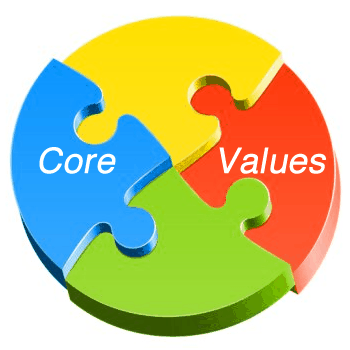Leadership is a changing word. It rarely carries the same meaning throughout different contexts, cultures, eras, or ideologies. It is constantly evolving and changing based on the people and the way they receive a leader. Because of this, universals are hard to narrow down. It makes for a complex concept because it changes so rapidly and sometimes unexpectedly. But while leadership adapts and molds, there are aspects that are consistent and applicable in many contexts. This short essay is going to discuss one of those important and universal aspects to leadership which is values.
Values are at the core of a team. Within every team, they value one end goal of some type. Some are more personal and selfish, and some are collaborative and team oriented. Within any healthy team, there is a goal that is attainable and worth working towards. People have two types of values, personal and cultural. A personal goal in the context of the professional world may be career oriented such as being promoted or changing departments. While personal values are strong motivators and push people towards better work, they don’t revolutionize the way a team interacts. In some cases, a personal value can actually be detrimental towards the team. If someone has their eyes set on something that requires them to superseded coworkers, it can break relationships between the team. (Dean, 2014).

The other type of value is a cultural value. This is more complex in may ways because it can be hidden in the subconscious of a person. We value and peruse certain things because our culture tells us that we need this or that. It isn’t necessarily something that we’ve reasoned to need, but rather “naturally” need it.It is that natural response that is often dictated by the environment or otherwise known as the culture. This is tricky as a leader to navigate because people aren’t as aware of these values but they are still strong. This lack of awareness can add confusion for both parties when resolving conflict or navigating as a team. (Moran and Harris, 2011).
Every one has a value, but establishing a common value as a team is the challenge. In order to obtain a common value requires hiring and building a team that agrees with each other. This doesn’t mean that everyone has to be the same person, but the common and core value of everyone should be closely related.

For example, the company that I work for values the client experience. Everything we do is filtered through our core value of making the client’s experience better. When I was going through the interview process a few months ago, this was something they kept addressing. They were careful to make sure that I was client oriented and would do what was right for the client. When building your specific team, this is incredible important. You need to be able to establish what your core value is, and what type of team members will be able to share in that value.
Sources:
DEAN, K. (n.d.). Values-Based Leadership. Retrieved March 25, 2015, from http://www.valuesbasedleadershipjournal.com/issues/vol1issue1/dean.php
Moran, R. T., Harris, P. R., & Moran, S. V. (2011). Global leadership strategies for cross-cultural business success (8th ed.) (p. 292-322). Oxford, UK: Elsevier Inc.

Great observation! I agree that developing and defining common values is the key to success in any company or organization. This is true, not only within an entity, as you describe, but also when seeking to work collaboratively with entities of other cultures. When reaching out to other cultures, it is necessary to identify the common values that will form the foundation of the collaboration. Once these common values are identified, they become the basis for building trust between the cultures, and trust is the basis for all meaningful intercultural endeavors. If we can reach agreement on deep level core values, then it becomes much easier to accept and celebrate the surface level cultural differences that help bring new ideas and innovations to a company or organization.
Great article! It is important for a leader to understand the values of their people. Nowadays organizations are very diverse. When dealing with such organizations it is important to understand that people will have different values depending on their cultural background and previous experiences. As leaders we must attempt to understand these differences in values to help us motivate our people. One topic that is often discussed is the “why.” Many people contribute to their organization whether it be ideas or products. This is considered the “what.” The methods that they use to get a job done is considered the “how.” Well the “what” and “how” are the two main focus on many organizations leaders for increasing productivity and efficiency, the “why” is often overlooked. In order to increase an organization’s ability to produce more efficiently while maintaining engagement, the leader must understand the “why” which is what one person values and the reason for contributing to the organization. Values of our subordinates must be understood to help us as leaders to maintain engagement, which in turn increases productivity and efficiency.
You can read more about the why? from Simon Sinek at
https://www.startwithwhy.com